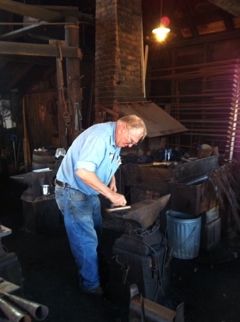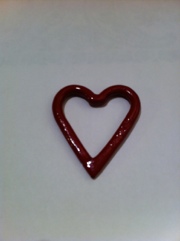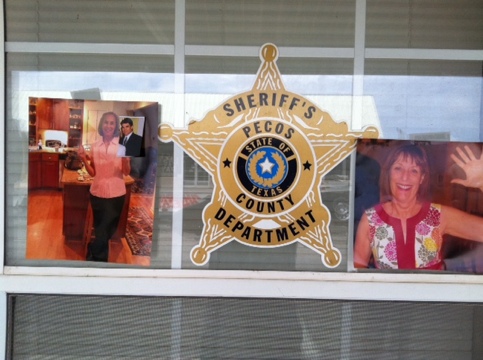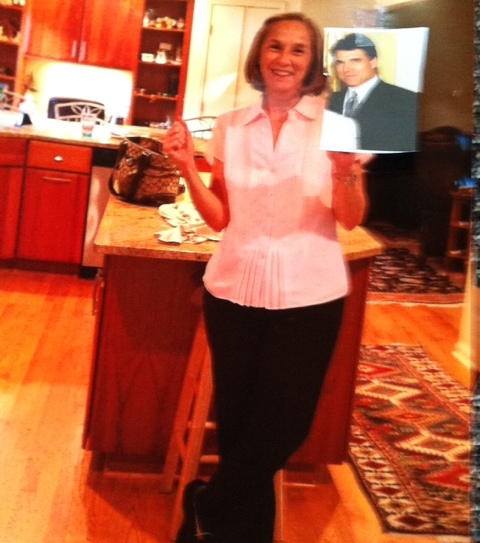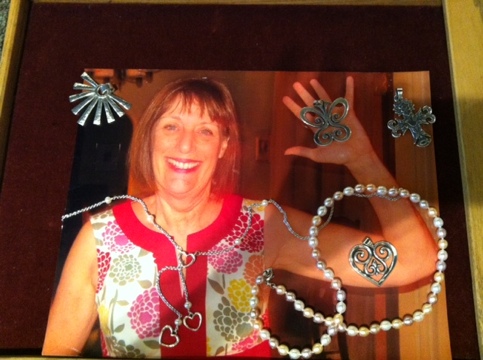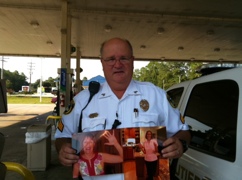
The Salvation Army distribution center in Baton Rouge, with bags of donated food on the table waiting to be packed into boxes for flood victims. On the floor behind the table are stacks of donated food sorted by food type. In the distant background are more stacks of donated clothes.
I left the house thinking I was running a quick errand.
I’d spent an hour ruthlessly going through my closet, pulling shirts, dresses and slacks from hangers. Dismissing the “I’ll lose weight” trope and the sentimental, “Oh, I wore this at such-and-such event,” if it had hung there unused for more than a year, out it went.
I live in Baton Rouge, Louisiana. If you’ve been out of the country, or too focused on the Olympics or the presidential race to see the news, Southern Louisiana experienced what they’re calling a “1,000-year flood” in mid-August. Parts of my city got two feet of rain in less than 48 hours. Thousands of people lost everything. I am one of the lucky ones. High ground is a very fine point out here on the Mississippi Delta, but apparently our house has the advantage of a tiny bit of elevation. It was enough to make all the difference. My husband and I are not among the suffering. Our house stayed dry. We are not pulling up carpets or tearing down drywall. We are not displaced.
I thought the least I could do was gather some clothes and drop them off at the Salvation Army’s distribution center. My husband announced he was interested in joining a group of journalists who were volunteering to help with cleaning out flooded homes, calling themselves The Muckrakers. But he’s having chemotherapy right now, and his doctor gave him a firm “No.” Too much bacteria in the air, too much mold, too high a chance of a scratch or a wound that could cause a nasty infection. So I told Steve while I was dropping off the clothes I’d check to see if there was a need for volunteers. There’d be no risk of mold or layers of swampy mud. I pictured us ironing or hanging donated clothes carefully on neat racks as flood victims searched out what they needed.
The permanent distribution center was also flooded and was relocated in an empty department store in a decaying mall. My first indication that I was in naïve la-la-land was the hour-long line of traffic I sat in, circling the entire mall and the street leading into it. When I finally drew close to the store, I put down my window and asked a police officer directing traffic where I should go for a drop off. He pointed to a parking lot on his right.
I pulled up at the curb, grabbed my garbage bags of clothes and hurried in, thinking I’d drop them off, find a sign-up for Saturday and head home. My husband and I would return ready to work bright and early the next morning. But then I walked inside and my jaw dropped.
To my right was a mountain of garbage bags, boxes and laundry baskets heaped with things sympathetic people like me had donated. In front of me, in the aisles ran – literally ran – volunteers from church youth groups, scout troops and people just off the street, with sheets of paper in their hands, lugging garbage bags and digging through hastily sorted items, some of which sat under hand-lettered signs with vague gender and sizing, others just bursting from bags hurriedly ripped open in frustration. Whoever owned the building had donated the use of the space. The electricity was on, but not the air conditioning. It was over 95 degrees outside. There were no windows.
A sweaty athletic-looking young man paused beside me. “Dropping that off, Ma’am?” I nodded. He thanked me, took the bags and added them to the mountain. Before he hurried off I found my voice. “Should I stay to help?” He grinned and didn’t bother to answer the ridiculous question. “Sign up is over there,” he pointed. “Just latch onto any of these people filling bags and they’ll show you what to do.”
It was at the sign-up table that I first caught sight of the line at what had once been the store’s front door. There were hundreds of people, three and four deep, each with a paper in their hands and standing in the broiling, Louisiana sun. I glanced around the store. There were maybe 30 volunteers. And my jaw dropped again.

Boxes of food (and toilet paper and paper towels) being stuffed and stacked on pallets for Louisiana flood victims.
The young woman I latched onto couldn’t have been more than five feet tall or older than 15. She explained that the sheets were request forms, turned in by families, telling how many lived in the household, what was needed and their sizes if they wanted clothing. The little dynamo moved at a fast clip, dragging two garbage bags and filling requests for two families at once. Scooting after her with my freshly acquired sheet, I began gathering things for two adults and a child. The dynamo didn’t take a moment to introduce herself, too busy with showing me where the toiletries were centered, the first-aid supplies, the diapers, the pet food, the clothes and the shoes. Bottled water, cleaning supplies, and boxes of food were set up in stations out in the parking lot.
As I leaned over a tall cardboard box labeled, “Men’s Shoes,” digging hopelessly for a pair of size 12s, I asked, “Wouldn’t it be better if someone took a moment to organize these?” She pushed her dripping hair back and asked, “Did you see those people out there? Some of them have been waiting before we opened.”
In half-an-hour I was just as sweaty as the rest of them. My second sheet was a conundrum. Scrawled across the top were the words “NO ENGLISH!” All it told me was that there were three adults and five children in the family. Everything on the list was checked. They needed clothes, shoes, diapers. But there were no sizes. The toiletries were easy enough, but when I stopped at what a few minutes ago had been a big bin of deodorant, it was empty. “What happened to it all?” I asked a passing gatherer. “It’s already gone,” was the quick, obvious answer. At the diaper station I showed the lady organizing the supplies my sheet, and she shrugged. “Well, with five kids, there might be more than one in diapers. Grab a package of each size and lots of wipes.” There were two dogs listed. I stopped at the pet station and was told, “No more dog food.” I threw in a big bag of cat kibble, hoping it would be enough to keep the pets from starving without hurting them. (The next day, a woman shouted in answer to a question, “The only dog food we have is if your dog will eat cat food.”) Shoes. Dear God, what should I do about shoes? Five kids. I grabbed random sizes in as gender-neutral styles as possible. Varying flip-flops in ladies sizes. A couple of men’s athletic shoes went in, as I wondered if the recipients would think I was crazy if there were no men in the family.
In the clothing section I joined other “shoppers” on the floor, scavenging in random bags, looking for anything that might serve as one-size-fits-all. Were they heavy? Bone thin? Tall? Short? How could I know? If I’d had a pen and paper I would have included a note that said, “I did the best I could.” Like a weird, bad-dream Santa, I lugged two bulging green garbage bags to the front door, turning them over with the now sweat-smeared sheet to the man who would bellow out the family’s name. As I grabbed another sheet I wondered what they’d think as they opened the bags.
The irony wasn’t lost on me, as I hurried along dragging my sacks, that this was all unfolding in an abandoned department store. It must have been a nice place, back in the day. The fading words “Donna Karan” looked down on the mountain of clothes-filled garbage bags. Under the “Cole Haan” sign was a scattering of baby shoes. Inactive escalators led to a dark upstairs, the wall-covering peeling along the sides. It wasn’t hard to imagine racks of things, crispy in their newness, and shoppers, serenely sliding hangers, taking their time, enjoying making the choice of, “This I will have. This I will not.” As I glanced at my fellow volunteers, the scene seemed almost Dante-esque. Figures lugging huge garbage bags over shoulders, a few wielding shopping carts which were reserved for the “really big families.”
It was so damn hot, it easily could have been a circle of hell. I laughed at myself, in my light-colored capris, now streaked with grime, as my feet swelled in my chi-chi espadrilles. Why hadn’t I at least worn my good, sturdy sneakers?
Once, when I opened a bag of clothing, still marked with hand-labled price stickers and covered with mildew and black spotty mold, I almost cried. Leftovers from a long-ago garage sale someone stored carelessly and now unloaded on the unfortunate. “Shame on you.” A young man nearby asked, “What?” and I was surprised to realize I’d actually said it out loud. I showed him the garbage in the bag. He told me unusable items were put into a box at the back of the store. When I got there I discovered “the box” was actually about six or eight boxes, all of them overflowing.
It wasn’t the only time I wondered about the donors.
A shopping cart was brought in from the parking lot, filled to the top with boxes of garishly colored women’s shoes, all of them with 8-inch heels. Maybe, at another time, someone shopping at the Salvation Army might want them. But now? Would any woman wearing a size 6 shoe, who had seen water come up to the rafters of her home, really think a blazing pink pair of platform heels helpful? I didn’t know. But I wasn’t passing them on to anybody on my lists. I stuck with athletic shoes, or a decent pair of leather flats if I could find them. In my searches I found mud-caked shoes, stained underwear and shirts with dried food still on them. More often I found bags of clean things, not new but some of them only gently worn, many of them with labels that would have belonged under the Eileen Fisher or Donna Karan signs.
In the time that I was there, only one person lost it. I was rejoicing at a recent donation of a whole box of deodorant when her screaming got my attention. She’d breached the tables separating the entrance from the crowd, and was brandishing what I think was a pair of child’s Uggs. I waited more than three hours, she wailed. Three hours, when I could have been trying to salvage things from my house. Three hours in this heat and this is what you give my kid? Don’t you people know it’s summer time? It’s almost 100 degrees outside! Do you really think he can walk around with snow boots on his feet?
I was stunned at how torn I felt. I wanted to leap to the defense of whoever had filled her bag. Did she think this was McDonald’s and we’d failed to fill her order correctly? Did she think scavenging through this towering mess this was easy? It was an almost impossible task, finding a specific-sized pair of shoes, especially in boy’s sizes. And yet, as I looked at her tight, despairing face, I also felt crawling shame at my good fortune. She was so hot, so exhausted. And she wanted to help her child. I also had the mad desire to throw myself at her feet and say, “I’m sorry. This is so inadequate. I’m so sorry.”
At some point they stopped accepting people in line. Those sent away were told to return tomorrow. By 4 o’clock there were dozens of people waiting, not hundreds. And finally, knowing my poor little dog was home and hadn’t been out since early morning, and that my husband, depleted from chemotherapy and a full day’s work would soon be home, I decided to leave. Tomorrow. Like the people who didn’t make it into line, I’d come back tomorrow.
End Note: Steve and I did return to the Salvation Army distribution center on Saturday. Those who stayed later than I did the day before worked hard, as we found more organization. There were more volunteers. The line of people moved faster, they arranged to consult with the folks turning in forms to get more specifics about their needs. We spent most of the day assembling the boxes of food items to be distributed in the parking lot. Those are the pictures the accompany this post.



